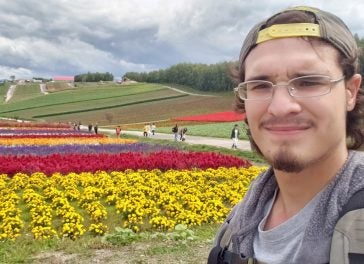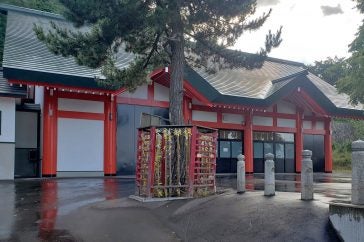
By Neil Nachbar
Jason Valdes started taking Kenpo karate classes as a 10-year-old. When he became an instructor of the discipline a few years later, he had a yearning to learn more about the Japanese culture, which heavily influenced the form of martial arts.
The University of Rhode Island’s International Engineering Program would end up providing that opportunity.
“I heard some great things about the International Engineering Program when I was in high school,” said Valdes. “Since URI has a strong engineering program and the IEP offered a Japanese track, I thought it would be a great opportunity to learn the Japanese language and share the Japanese culture with others.”

Valdes is pursuing a bachelor’s degree in mechanical engineering, while minoring in electrical engineering, mathematics and physics. With three years of courses and internships under his belt, he’s taking classes at Niigata University in Niigata, Japan this year.
“All of the classes I’m taking are taught exclusively in Japanese,” said Valdes. “They are scheduled as back-to-back, one-and-a-half hour periods. It’s challenging to translate the language for that long.”
The cultural differences between Japan and the United States has also been adjustment for Valdes.
“I’ve noticed that a hallmark of Japanese culture is conformity,” said Valdes. “Compared to the United States, where everyone tries to stand out from the crowd by looking as distinct as possible, the Japanese are expected to behave and look more unified.”
Valdes will begin his IEP internship at Shimadzu Corporation in Kyoto, Japan next month. The native of Warwick, Rhode Island expects to help develop the company’s medical monitoring equipment. Shimadzu supplied much of the equipment for URI’s Fascitelli Center for Advanced Engineering.
After he graduates next year, Valdes would like to put his engineering and Japanese language skills to good use.
“I would love a job where I could spend some of my time in Japan, whether it’s as a technical liaison or as engineering support for products sold to Japan,” said Valdes. “I would enjoy that quite a bit.”
Valdes would also enjoy teaching Kenpo karate again, while applying the language skills he’s learned at URI and in Japan.
“I always thought it would be cool if I could teach karate using the language that it was originally taught in,” said Valdes.
